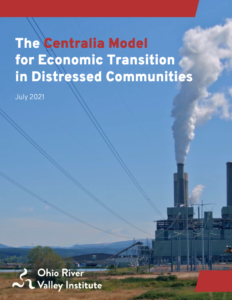Full Title: The Centralia Model for Economic Transition in Distressed Communities
Author(s): Sean O'Leary
Publisher(s): Ohio River Valley Institute
Publication Date: July 20, 2021
Full Text: Download Resource
Description (excerpt):
If there are some industries in which immense amounts of investment and economic growth can fail to produce significant increases in jobs and prosperity, might there be other kinds of industries and activities in which much comparatively small investments can deliver disproportionately large gains in jobs and incomes as well as in other measures of prosperity, including quality of life? If the experience of the town of Centralia, Washington and surrounding Lewis County is an indication, the answer may be yes. And that experience may be instructive for local and state policymakers in Appalachia, where certain communities have been economically distressed for decades and now face added challenges as the world and the nation transition away from fossil fuels.
Despite being located in the Pacific Northwest, Centralia has historically struggled economically. For decades the town’s largest employer was a strip mine, which employed 600 workers, and its other major private employer was a coal-fired power plant, which employed another 300. Now the mine is gone and operations at the power plant have been reduced by half as the plant works toward a planned retirement in 2025.
That scenario seemed to Centralia and Lewis County residents like a possible death sentence when it was first contemplated fifteen years ago. But, after the coal mine closed in 2006 and it was announced that the power plant would retire in 2025, the mine’s and power plant’s owner, TransAlta Corporation, struck a deal with the state of Washington and environmental groups to fund an economic transition plan to help Centralia and other areas of the state adapt to the emerging clean energy economy.
